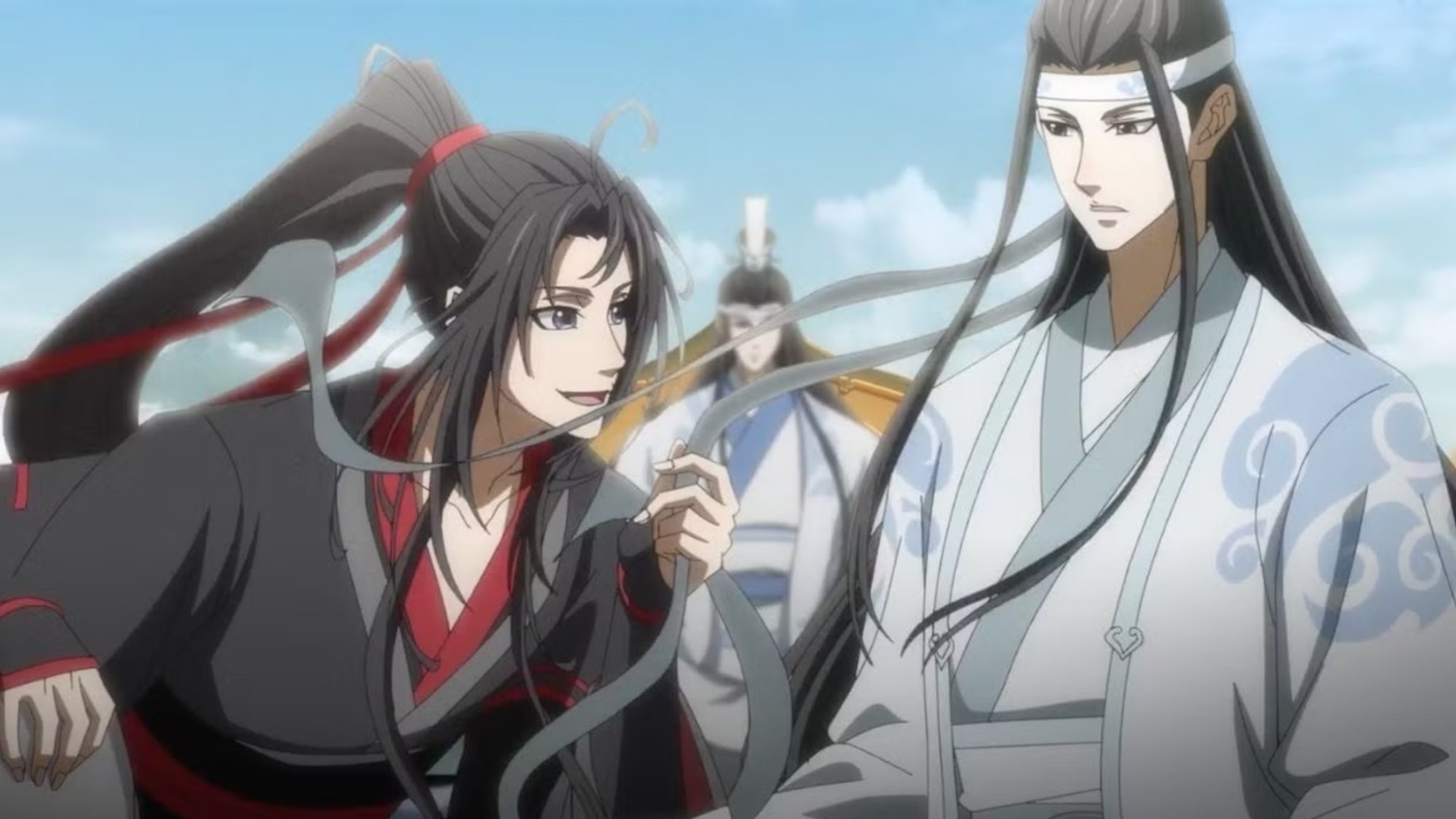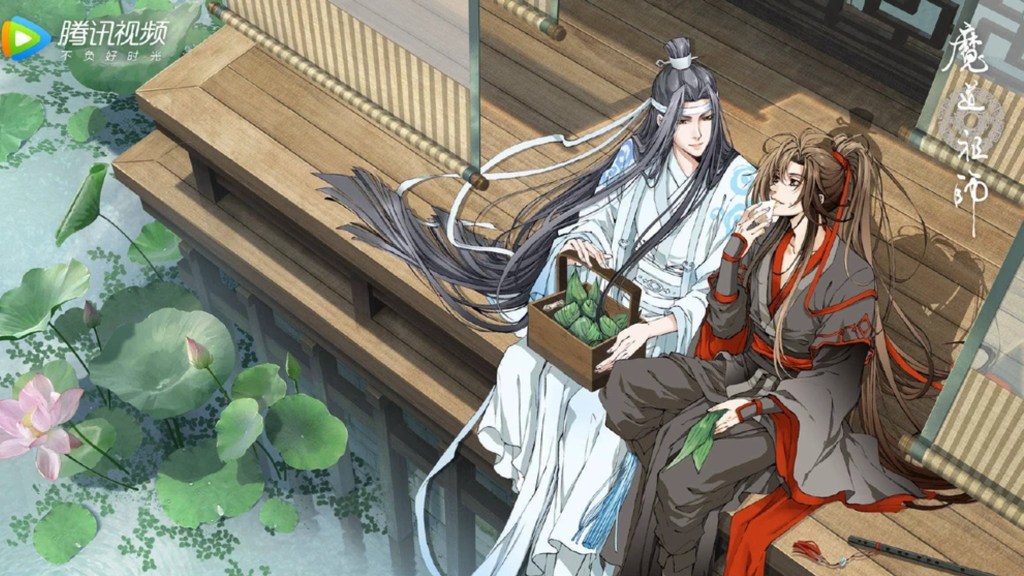
When it comes to epic BL romance in Donghua, almost every fan will cite Mo Dao Zu Shi, or Master of Diabolism as one of the top recommendations. The story, which centers around Lan Wangji and Wei Wuxian, depicts a tender and emotional love story that spans the course of nearly two decades. Mo Dao Zu Shi’s Donghua is based on the original story told via Chinese Light Novels of the same name, and many fans may be wondering why the television adaptation is far less steamy than the source material.
Chinese Light Novels have become an experimental playground for queer romances. With many boasting rich narratives and high fantasy elements, they can be a breath of fresh air for those burned out on the tropes and “romantasy” vibe of English LGBTQA+ lit. Mo Dao Zu Shi is exactly this type of story, providing readers with a complex web of plotlines bolstered by the growing romance between the main leads. It’s thanks to this addictive narrative that the Donghua is able to thrive despite missing some of the more obvious romantic elements from the Light Novels.

Are Wei Ying and Lan Zahn Canon in the Donghua?
The first big thing to tackle in the breakdown is the status of Lan Zhan and Wei Ying’s relationship. While the Light Novels and graphic novel adaptation clearly show the two as romantically involved, this is less clear in the animated series. Despite a lack of obvious physical contact and open flirting between the two men, they are a canon couple.
This might also be confusing, as Wei Ying regularly states that he “does not like men” in the anime and the Light Novels before becoming involved with Lan Zhan, but this has been broken down as part of his journey to understanding himself. While he does say these things, he never has or attempts to start a relationship with female characters. In a way, he seems to identify with and connect more strongly to the women in his life during the story, especially when he is younger. This seems to imply that he is more feminine in his romantic expression, which creates a sweetness in him that is very cute and innocent in the earlier part of the series.
The way their relationship is depicted in the Donghua is subtle, with the show creators relying on metaphor, verbal interactions, and carefully placed non-sensual touching to illustrate their connection.
So Where Are the Anime Kisses?
It might be surprising to hear that Lan Wangji and Wei Wuxian never share a kiss in Donghua, especially considering how spicy the Light Novels and graphic novels can get. However, it is impossible for that level of relationship to be shown in any television adaptations due to Chinese censorship laws.
In China, it is illegal to visually depict two men engaging in romantic relationships. Because of this, the Donghua adaptation had to come up with other ways to show the deeper connection between the two leads without violating these laws.
These laws aren’t as strict for Light Novels and other forms of media, which allows for more freedom when creating new stories. Because of this, many BL Donghua are adaptations of existing novels that have developed a following in online communities. This can be seen in Mo Dao Zu Shi and Heaven Official’s Blessing among many others.
How the Mo Dao Zu Shi Donghua Gets Around Censorship Laws
While it might be a bummer that Lan Zhan and Wei Ying don’t share a kiss on screen during the anime, the show creators worked in some beautiful scenes that do a wonderful job of showing the audience how connected the two become. This is in large part due to the solid writing of the Light Novels, which offer depth in both characters and the narrative that aren’t dependent on just Wei Ying and Lan Zhan’s relationship.
Throughout the story, viewers see Lan Zhan’s crush on Wei Ying from their first encounter. He blushes, gets worked up, and goes out of his way to avoid Wei Ying to prevent himself from getting closer to the other boy. As they grow older, Lan Zhan’s affection for Wei Ying blooms into a deep loyalty and protectiveness that is seen repeatedly, especially after Wei Ying takes on the mantel of the Yiling Patriarch after giving his Golden Core to Jiang Cheng.
With emotional phrases uttered by Lan Zhan like “Come back to Gusu”, a kiss isn’t even needed.
Wei Wuxian’s love for Lan Wangji is slightly different, as he is a more physical character in personality and affection styles. From the beginning of the Donghua, it is clear he thinks about Lan Wangji often and even uses the song Lan Wangji sang to him during a specific event in their childhood subconsciously, showing just how profoundly the other man’s presence has impacted him.
In later scenes, Wei Wuxian regularly looks to Lan Wangji for comfort, climbing him when dogs chase him, or regularly messing with the white ribbon Lan Wangji wears around his forehead. This ribbon’s importance is described in the Donghua and the Light Novels as an emblem of purity and self-control that can only be handled by the wearer’s “fated beloved”. Wei Wuxian is constantly touching that ribbon, hammering home the point without any hand-holding needed.
In addition to these little moments, important scenes like Wei Wuxian’s puppet possession are a critical show of symbolism within the Donghua. During a scene in the last season, Wei Wuxian projects himself into a small, paper puppet. In this form, he floats to Lan Wangji’s face, purposefully touching his lips. Lan Wangji returns the gesture by wiping a smudge of dirt from the blushing puppet’s face. This moment of tenderness can technically be shown, as it is a paper puppet and not Wei Wuxian’s actual form.
We also learn that after Wei Wuxian’s death, Lan Wangji went to the location where he died, searching purposefully for his remains. Instead, he finds the young boy Wei Wuxian, and brings him home to raise him. This makes him and Wei Wuxian both “fathers” of the character Lan Suzhui.
Romance Doesn’t Need to Be Hallmark to Be Real
While censorship can be frustrating, it is interesting to see how so much love and character growth can be depicted in a BL Donghua simply by emphasizing the tone of voice or purposeful actions of a character. In the era of “how much spice is there,” when judging a romance in any form, Donghua seems to challenge the idea that more mature content means a better love story.
While watching Mo Dao Zu Shithe relationship between Wei Wuxian and Lan Wangji is so delicately stitched together. Every purposeful action or moment of dialogue fuels their interactions, making their love more believable and passionate than any kiss could manage. The focus on these elements also showcases the complexity of their personalities, making the overall story a more immersive and exciting experience for viewers.
One of the most remarkable things about the Mo Dao Zu Shi Donghua is that after a while, you forget they should kiss, because in your mind, they already have. In the moments where they play music together, or cast magic together, or Lan Wangji clutches Wei Wuxian’s lifeless form as he protects him from the world, it is clearly understood that these characters are tethered together in a way that only such delicate storytelling could achieve.
One moment that is easily missed in the Donghua comes at the end of the series. Wei Wuxian and Lan Wangji are facing off against the clans in the second siege of the Burial Mounds. Inside a cave, the two stand as the only protection for a handful of juniors, including their adoptive son and Wei Wuxian’s nephew. Together, Lan Wangji and Wei Wuxian use their cultivation to draw out the power of the blood pool at the center of the cave, and for a moment, their outfits are dyed a deep red.

In Chinese culture, red is used in marriage clothes. The color symbolizes happiness, good fortune, and felicity. In the Light Novels, the two are married, and there is official art of the pair wearing red wedding clothes. In the Donghua, this moment symbolizes their combined choice to become cultivation partners, another term for marriage.
So not only did the Donghua clearly depict two characters falling madly in love without a single kiss, but they managed to imply they ended up married on top of that.
Mo Dao Zu Shi is so much more than a BL story or a Light Novel adaptation, it’s a very beautiful and thoughtful take on the expression of love, and what two people will due to be together, even when the world itself is falling apart. While the censorship laws in China can be difficult for the groups it affects, the fact that such beautiful stories can still be told is wonderful, and the focus on the emotional elements of the romance can make something even more special than just a quick kiss in between action scenes.